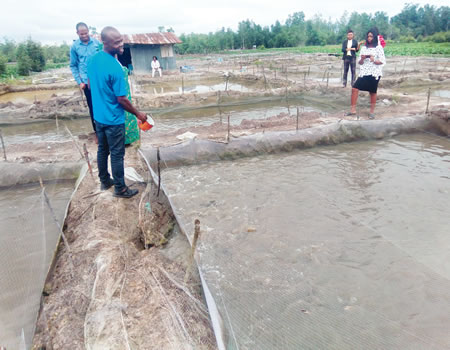MR Forgive Mapamiku is a graduate. after walking the length and breadth of Delta State in search of a white collar job that he believed was befitting of a university product, he opted for commercial motorcycling. After much persuasion, he heeded the advise of a friend for a more dignifying job in aquaculture. Forgive had run into his friend while plying his okada trade in the suburbs of Warri. The young man considered his friend’s advise and started the business with less than N45, 000 in 2004.
After a few months, he had nurtured his fingerlings into maturity for harvest. But like any fresh business and its attendant teething challenges, Mapamiku was becoming skeptical on whether he could continue or build on his one plot enterprise.
As he struggled to make a decision, fortune smiled on him in 2014, 10 years after he started the business, when he attended a meeting where some attendants were selected for further training by the Aquaculture Service Providers (ASPs) of PIND. He was one of those finally selected. The ASPs, trained by PIND, a brainchild of Chevron, have the mandate to build the capacity of new and existing fish farmers on business skills and best pond management practices.
Mapamiku acquired these skills during the training, which gave birth to the development his business has witnessed. the former okada driver now has ponds at Egbokoda in Warri South West Local Government Area of Delta States.
Today, unlike many other youth are still seeking white collar jobs that are no longer readily available, Mapamiku boasts of three acres of land that accommodates more than 35 ponds where he’s making great fortunes. He also has a demonstration pond where he trains beginners in the art of fish farming and trading same profitably with modern business skills and practices.
The PIND effect in business partnership
Credit goes to PIND for Mapamiku’s success in aquaculture. The Nigerian nonprofit organisation was established by Chevron Corporation to build partnerships and equitable economic development in the Niger Delta. It operates in the nine states of the Niger Delta namely: Abia, Akwa Ibom, Bayelsa, Cross River, Delta, Edo, Imo, Ondo and Rivers. Its area of intervention is in identifying growth potential, drivers and constraints in the agricultural sector of palm oil, cassava and aquaculture.
With the aid of data, the NGO works with various market participants such as farmers associations, private companies, government agencies and service providers and many others to pilot and scale up value chain projects in aquaculture, palm oil and cassava farming in order to improve agronomy and business practices of farmers, increase their access to and use of efficient technologies and facilitate linkages between market actors. To ensure sustainability, the business providers, trained by PIND to support the farmers and SMEs, continue to serve the businesses, selling their services to them without PIND’s involvement.
As such, more Mapamikus have been churned out through the ASPs. PIND provided grants to train 12 ASPs and, in conjunction with others who had copied the model sponsored from other sources, held cycles of demonstrations in Ondo, Akwa Ibom, Delta, Cross River and Rivers states for farmers and members of the National Youths Service Corps (NYSC) as well as ex-militants. PIND’s 2017 report also showed that it has trained 20 ASPs who have, in turn, churned out 2, 021 fish farmers.
Between 2010 and 2017, a total of 7,742 made up of 2,323 and 5,419 male and female fish farmers had received training services and adopted improved practices to produce immense result thereby depopulating the unemployment market and restiveness in the Niger Delta.
Attesting to this, Mr Friday Diyen, an ASP trained by PIND, and who started the fish farming journey in 2012, narrated to Sunday Tribune how his idea was given a boost.
“In 2016, we were called by PIND with other ASPs in the region and told that there was N1 million grant that we could win to scale up the demo project to more farmers. This grant helped me a lot. I was able to get all necessary materials I needed pumping machine, pH meter, the sucking and discharging hoses and other things. The grant assisted me to boost my capital,” he stated.
Diyen has since then, moved up in the social ladder. “From this work, I have properties, train my children and pay extended family people, among others. It has been wonderful,” he said.
As it is with aquaculture, PIND has also invested in the cassava and palm oil sectors through the training and financial services, information/advice for farmers and small businesses, which have added to the core value chain functions, that is, production, processing and marketing, to grow, develop, learn and adapt in the restive region.
Coordinator of Partners for Peace (P4P) a non-governmental organization partnering with Chevron in the Niger Delta, Chief Africas Lawal, while speaking on the PIND’s network development approach to peace-building, disclosed that over 7, 000 active peace actors have joined membership of P4P.
“One of the things we do is to see how we can build their capacities so we have state chapters in all of the Niger Delta region. The most important thing, however, is that all our peace messages are getting across, even those who are not our members participate through our radio programs, information bulletins and trackers.”
He further disclosed that among members of the P4P network are former agitators and cultists who have now accepted the peace initiative structure and are, themselves, peace ambassadors to their various communities, while many of them are gainfully employed and changing the narrative of the volatility and crime-prone state of the region.
Today, courtesy of PIND, Mapamiku has become a household name at Egbokoda – Warri as he has become an employer of labour. No fewer than 25 people are working under him at his numerous fish ponds. According to him, his customers come as far as from Rivers State and he‘s currently planning to explore the international market with his dried fish.
Mr Diyen, having built much capacity in the business in addition to growing fish, has turned trainer of other prospective youths on how to manage resources, plan and do daily recording from which he now earns more money for himself.
On his part, Imo-born Agbuebu palm oil farmer now boasts 25 employees working on his processing mill as a result of the modern processing machine which has increased kernel by-product and supply of palm oil to manufacturing companies.
These are success stories which those behind them hope would soon be replicated all over the Niger Delta to erase an atmosphere where despair, unemployment and militancy used to be the order of the day.







